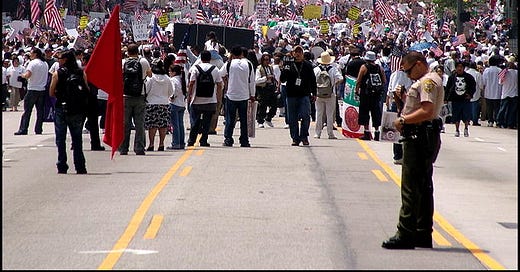As a musician, I have never had as many monthly listeners on Spotify as I do right now. The last time I had almost this many listeners on that dominant streaming platform was in January, 2024, when my first album about Israel's genocidal war in Gaza appeared on the platform.
Therefore I conclude that Trump's election, and genocide, are good for the economy. Is my logic flawed?
No more or less flawed than the pundits on TV talking about something they call "the economy," in reference to the percentage of the workforce that is employed, from which they draw all sorts of nonsense conclusions.
In reality, as any real economist will tell you, there are many economies, not just one. When the pundits talk about "the economy" they're generally talking about what's good for Wall Street -- what's good for corporate profits and for the stock market. Wars, fires, and floods can be very good for the economy, by this measure, as long as there's enough of a society still standing afterwards to finance reconstruction.
Wars, fires, and floods are good for the economy. That's not fake news, is it? It's just looking at the numbers.
When cities need to be rebuilt after they're destroyed, assuming the financing exists, who's going to do the work? If we have lots of immigration, then mostly immigrants will do the work. If there are lots of undocumented immigrants, the workforce will likely be full of undocumented workers.
Why is this the case? Because it's more profitable to pay workers less money to do more work. Therefore immigrants, and especially undocumented immigrants, are preferable to other workers, since they have every reason to be working harder, while getting half the pay a citizen would be able to demand. This means more people to build more houses for less money -- a much better bang for the buck for all the investors and homeowners alike! Good for the economy, right?
That's what they tell me on TV. "Our economy" depends on immigration, especially the illegal kind, because otherwise there wouldn't be enough workers in many industries, because citizens won't do those jobs.
You can hear this kind of talk on mainstream corporate and "public" media every day, of various political persuasions, including the ones positioning themselves as "objective."
It's all demonstrably nonsense, however, of the sort that gets a lot of people really upset, and has folks yelling at their TV.
Luckily, there's a world beyond the United States, so we don't need to guess in order to draw conclusions about some of these things. In countries, such as the ones I go to frequently, where they don't have a big economy consisting of undocumented workers, you will daily see sights that, to an American, seem almost shocking. In countries like Denmark, you will regularly see white Danish people pushing mops, picking up trash, changing the sheets in the hotels, working construction, repairing cars, and so on. And they're getting paid well, they're in labor unions, they have months of paid vacation time every year, etc.
Is it possible to get citizens to do this kind of work? Yes. But isn't that bad for the economy?
Well, again looking at Denmark, it's one of the most egalitarian and prosperous societies on Earth. How's their economy doing?
It all depends on which economy we're talking about.
The economy of the regular people and the economy of the corporate elite are related, but not in some kind of predictable way. It all depends on how things are managed, by entities like governments, labor unions, cooperatives, social movements, etc.
We can be building lots of houses at a very low cost, but if the houses are all mansions, and the workers aren't making enough money to save up to buy their own houses while they're building other people's houses, then this is a situation that might conceivably benefit a significant portion of the society, but at the same time it maintains a severe state of ever-worsening inequality between those who can afford to buy the mansions, and everybody else.
Wouldn't it be much better for the economy of those of us who don't own mansions if we were all getting paid good wages with good benefits, and had access to actually affordable housing, like how it is in so many other countries still today that I visit regularly?
If we're together on the logic up to this point, that "the economy" for mansion-owners is different than "the economy" for people trying to rent an apartment on the rental market and work in the construction industry or work in a restaurant or in a retirement home, then this is where things tend to go different ways in terms of the question of what is to be done about this situation of severe and quickly-worsening inequality, and for so many millions, real desperation.
History, and the world around us today, is full of examples of the two main kinds of responses societies can have to this kind of situation, which is one that has repeated itself over and over again around the world in so many different ways for millennia.
Whatever their views of what good immigration policies would look like, or what kinds of political leaders they might like to see, when people see an untenable situation, with insufficient affordable housing, too much profiteering of the limited supply, too few jobs that pay well enough to cover life's expenses, and so many people -- including many immigrants -- competing for that housing and for those jobs, at some point people often will adopt one of two basic outlooks on how to deal with reality.
One way is to seek to work together with the people around you, and stand up as a class for our collective class interests, as workers, renters, regardless of immigration status or any other demographic factor, to fight for a society where everyone has a good union job and no one has any incentive to undermine the good union jobs by taking half the money for the same job, for example.
The other way is to exclude a significant element of society, which historically in the US has involved making laws against all kinds of different immigrant groups and other groups, sometimes specifically targeting Blacks or Asians, other times specifically targeting eastern and southern Europeans.
Now I'm almost getting to where I want to talk about the Aughts. I'm trying to set the stage, because I think if we want to understand what happened then, we need to get past the fake duality we hear constantly on the corporate media, especially on the liberal end of it these days, about how you can either be in favor of a "growing economy" and pro-immigration, or you can be a regressive, xenophobic racist who doesn't understand how immigration is good for "the economy" and wants to live in some version of the Middle Ages.
There are other options, which bear much more resemblance to the real world. Such as the immigrant rights movement of the Bush years, that culminated in the absolutely massive demonstrations in the spring of 2006.
From my vantage point as a participant-observer at the time, what distinguished this movement, aside from its massive size and very broad participation among so much of the Latin American immigrant communities across the US, was that it was not trying to pose the question of criminalizing undocumented workers, which the Bush administration was seeking to do, as a moral one, nor were they taking any position like millions of undocumented workers were good for "the economy" in the way that agribusiness would define it.
The orientation of the movement was one familiar to anyone who has spent time in places with a strong labor movement.
We have relatively few people in the US organized into unions, so many people aren't familiar with the culture of labor unions that you'll find in places that have them, but in a good union, the organizers and union officials are doing everything they can to make sure immigrants and other potentially marginalized demographics are included in the union wherever they're part of the workforce, because of the basic, practical reality that if everyone's in the union, no one will want to be a scab. If you don't have strikebreakers messing things up, and the solidarity holds, then the union can demand good wages and working conditions. Otherwise we're divided and conquered.
The mainstream English-language press hardly covered the movement at all, as far as I recall. Also there was very little non-Latino participation. But it was still big, and then became gigantic, and then basically won, or at least managed to maintain the status quo, with the law Bush wanted to pass never getting through the Congress in the end.
I have a couple of especially vivid memories of the movement, which I think serve to illustrate the nature of it, why it clearly captured the hearts of millions of participants, and why it was successful, at least in a limited way.
On May 1st, 2000, I arrived in Manhattan to participate in a march. I had come with a contingent of college students and assorted other folks from Connecticut. I knew there was to be some kind of action on Wall Street at the end of the day, and in the meantime there was to be a march in support of undocumented workers.
I remembered Reagan's amnesty in 1986, and thought it seemed reasonable that the capitalists would want to do another one of those. I assume they want to keep it at a certain level -- unless the capitalists are really not being at all strategic, which never seems like a good assumption. Of course there would need to be marches to demand such an amnesty again, and I was glad to be participating in one, or so I thought.
What struck me when I got to Manhattan was not that there were only 200 or so people who seemed to have shown up for the action on Wall Street later in the day, but that there were at least 5,000 people from Latin America marching, and not one of them had a sign saying anything about amnesty for undocumented workers.
In fact, although maybe 98% of the people marching were undocumented workers who spoke either Spanish or an indigenous language as their first language, almost all the signs I remember seeing people carrying were repeating the same phrase, on home-made cardboard signs, in English:
WORKERS OF THE WORLD, UNITE!
Aside from the 200 mostly white suburbanites who had arrived from out of town, the average height of the people on the march was around five feet. This was made all the more obvious by the way the cops that were lining the entire route of the march towered menacingly above them.
There were about as many cops as there were marchers. The cops had arrived mostly by motorcycle, it seemed, and there were so many police motorcycles parked everywhere, the police were literally tripping over them. Many of the marchers looked very understandably terrified, but they marched.
No one knows more profoundly than the undocumented workers how much the existence of this super-exploited element of society is a class issue, not just for the undocumented, but for everyone. They all know that by taking half the wage of the citizens, they are bringing wages down for everyone. They know this is how it works, and that this is their role, as a group, to take less money because they don't have papers. They all know this. It's the rest of society that often doesn't, or believes nonsense about "no one else would do that work if they didn't."
The events of spring, 2006 were remarkable for many reasons.
One was the sheer magnitude of what was happening. This was so much more than the activist core having a demonstration in front of City Hall. This was a broad swath of society rising up everywhere -- though no one should be surprised if they never heard a thing about it. If you weren't there, it didn't happen.
In the spring of 2006, Spanish-language radio was abuzz with Bush administration plans to make being undocumented a felony offense, and radio acted as one of the main conduits of information, from what I gathered at the time. Millions protested in Los Angeles, Dallas, Chicago, and other cities. Many large cities had the biggest protest they had ever had, before or since, hands down.
I was more or less based out of Houston in the spring of 2006, with a new baby, whose mother, Nathalie, lived there. She knew the organizers of the protest, and I found myself singing songs of solidarity for the 50,000 people who gathered there on a Monday in April, which happened to be my 39th birthday.
The streets of Houston were completely full of people. It's a flat city, and I never had a vantage point to get an impression of how many people there were -- but a whole lot.
It was an intensely musical movement, with mariachi bands figuring into the whole thing in a big way. Every hundred feet or so along the march route, another mariachi band would be playing.
As we marched, truck drivers passing over the march on a variety of overpasses that can be found in downtown Houston were honking their horns in support, and it seemed to be all of the truck drivers doing that.
The lack of white, English-speaking Americans or other people not from somewhere in Latin America at this rally, as at the other one I mentioned, was depressing. It's not that there were none -- it's just that they were the same 200 or so folks I would expect to see at an antiwar demo or a Jim Hightower event. Those who poured out into the streets as an entire community, rather than as an activist core, were the Mexicans, Guatemalans, Salvadorans, and others from Central and South America.
There were other times in history in the US when there were mass expulsions of immigrants, and when laws were passed to drastically curtail immigration from parts of the world considered to be places where the undesirables originate. There were also times when land and property was expropriated from immigrants. There was the entire period of westward settlement, with land systematically taken from the Indians and distributed to those primarily white male US citizens who qualified to receive it under the Homestead Act.
After all of that theft and expropriation, all questions of fairness and morality aside, all blame of European refugees stuck in a cycle of violence and forced to go west aside, and all blame of people crossing the Rio Grande in the shadows aside as well, what kind of society have we gotten out of all that?
Certain people would, of course, say "the greatest country on Earth." But anyone who's traveled knows that the US is a country full of desperate poverty and growing inequality, compared to other industrialized, modern countries. It's not because we have too many people in this sparsely-populated continent. And it's certainly not that we lack tremendous resources of all imaginable kinds, or because some group of people in society doesn't believe in hard work.
The main problem, as I see it, is both a current and historical one. We are trying to have a society within an economic and political system that in so many ways is designed to be a funnel for the constant redistribution of wealth upwards, from the poor to the rich. We have long been ruled by a system that is set up to generate profit off of our state of division -- profits which benefit millions of people, while serving to immiserate so many millions of others, thereby keeping us at each other's throats. And now it seems all set to get so much worse.













Share this post